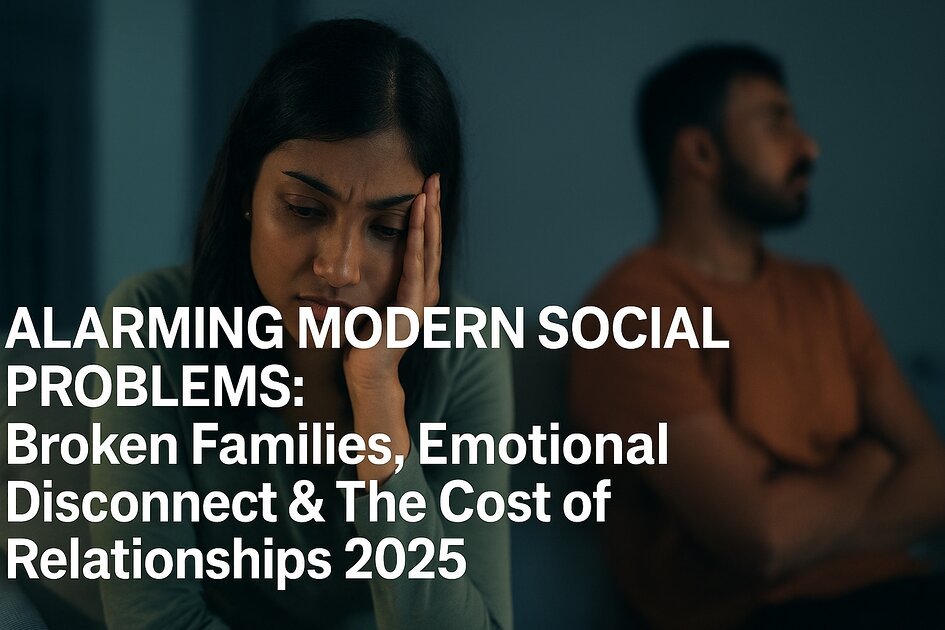What Are Modern Social Problems?
Modern social problems are spreading rapidly across both urban and rural India. Despite advancements in technology and living standards, we face severe emotional disconnect, fragile relationships, and increasing dependency on wealth for validation and survival.
Disintegrating Families: Homes Without Heart
The Collapse of Traditional Structures
One of the most visible modern social problems is the collapse of traditional family structures. With the rise of nuclear families, emotional support has weakened. NFHS-5 reports over 30% of Indian elders feel neglected. Joint family systems have faded, replaced by isolated homes.
Real-World Example
Urban homes now lack shared meals and intergenerational stories. Grandparents are lonely, parents are stressed, and children are addicted to screens. These broken families reflect a core emotional deficit in society.

Emotional Silence: Living Together, Yet Strangers
The Rise of Non-Communication
Another major modern social problem is the emotional silence in households. Family members coexist without truly connecting. Conversations are rare, and empathy is absent.
Alarming Data
According to NCRB 2023, youth suicides have risen sharply, especially among students. The absence of emotional expression and mental health awareness makes families emotionally toxic.
Education Without Values: Degrees Over Decency
Lack of Life Skills in Modern Education
The education system, while strong in academics, fails to teach values. Life skills, empathy, and ethics are ignored. Only 15% of Indian schools offer structured life-skills education.
The Outcome
Students chase ranks but lack resilience. As a result, many graduates are unemployable in emotionally intelligent workplaces. This is a growing modern social problem.
Lost Youth: Jobless, Hopeless, and Directionless
Unemployment and Despair
India’s youth face unemployment, scams, and job delays. The Centre for Monitoring Indian Economy (CMIE) states that youth unemployment was 22.9% in 2024.
The Impact
Contractual educators like Shikshamitras suffer chronic exploitation. Many youths report depression due to a lack of stable opportunities and increasing competition.
Digital Age Loneliness: Connected, Yet Isolated
Social Media and Emotional Disconnect
Modern social problems are amplified by digital addiction. Excessive screen time leads to isolation. Studies show that more than 4 hours of daily screen time causes depression and sleep disruption.
Online Illusion vs Offline Reality
People showcase their perfect life online but suffer loneliness offline. The emotional void deepens due to filtered realities and the absence of real interactions.
Women and the Elderly: The Forgotten Pillars
Ongoing Discrimination and Neglect
Women continue to face inequality despite legal rights. 1 in 3 women faces domestic abuse (NSSO). Elderly parents are left alone or moved to old-age homes. The India Ageing Report 2023 highlights that 20% of seniors live without support.
The Social Cost
Ignoring these pillars of society is among the most dangerous modern social problems, affecting the emotional backbone of homes.
Caste, Class, and Faith: Still Deep Divisions
Inequality Persists
Despite digital India, casteism and religious intolerance remain prevalent. Human Rights Watch (2024) recorded a spike in caste-related hate crimes. Dalit students face harassment, even in universities.
Rooted Discrimination
Society continues to prioritize class and religion over humanity, reinforcing discrimination and inequality.
The Money Mirror: When Love Needs a Wallet
Financial Status Over Emotional Bonding
Money has become the new foundation for relationships. Dowry demands and matrimonial filtering based on salary are common.
Transactional Relationships
Modern social problems like transactional love are growing. Friends are valued for their utility, not loyalty. Even marriages are assessed based on financial assets.

The Way Forward: Repairing What Truly Matters
Home-Based Healing
Fixing modern social problems begins at home. Actions like shared family meals, emotional check-ins, and encouraging open dialogue matter. Families must embrace mental health support and active listening.
Policy-Level Solutions
Government policies should promote emotional education, family therapy access, and elderly care services. This is essential for a healthy emotional ecosystem.
Humanity Must Begin at Home
Rebuilding Our Emotional Foundation
Modern social problems are weakening our emotional structure. GDP growth is meaningless without emotional strength. Broken homes, digital disconnection, and wealth-based relationships point to a society in need of healing.
The Generational Drift
Vanishing Traditions and Loss of Cultural Anchors
One of the less talked-about modern social problems is the fading transmission of cultural heritage from one generation to the next. Traditional practices like evening prayers, folk storytelling, communal meals, and village festivals are vanishing. As children grow up in nuclear urban homes, they lose the emotional and cultural grounding that once defined Indian identity.
Real-Life Consequences
Without cultural anchors, youth are more vulnerable to identity crises, social anxiety, and detachment from community well-being. Many are unaware of their linguistic roots, ancestral customs, or even regional values. This rupture between generations creates emotional rifts and increases social isolation.
Urbanization and the Rise of Hyperindividualism
Me-Centric Living and Social Fragmentation
The wave of urban migration and global influence has led to a rising ideology of self-centered success. While personal freedom is important, hyperindividualism discourages collective responsibility. Neighbors barely know each other. Extended family is seen as a burden. The rise in apartment-based living with no community bonding accelerates social disconnection.
Example:
A recent urban sociology study showed that over 60% of Indian metro households do not engage with their neighbors beyond formal greetings. This trend is fostering a mental health pandemic marked by loneliness, especially among working youth and elderly citizens.
The Influence of Consumer Culture
Love, Status, and the Shopping Cart
Consumerism has redefined how we measure happiness, status, and success. From dating apps judging compatibility by income to social media influencers monetizing their daily life, everything is up for sale. Even festivals, once about community bonding, have turned into Instagram showcases.
Cultural Shift:
Traditional Indian concepts like “Seva” (selfless service), “Shraddha” (reverence), and “Sanyam” (restraint) are being replaced by instant gratification and material validation. This shift contributes to anxiety, dissatisfaction, and societal envy.
The Emotional Cost of Ignoring the Problem
Modern social problems are not just political or economic—they’re deeply emotional. Broken families, insecure youth, neglected elders, and transactional relationships are all signs of a collective emotional emergency. And no nation can thrive in the long run if its people are spiritually disconnected and emotionally fragile.
Let us not wait for another crisis to value compassion, care, and community. Let us begin now—at home, in conversations, in classrooms, and in policy reforms.
Final Thoughts
We must prioritize feelings over filters, conversations over convenience, and values over valuables. Because no amount of money can replace a loving home.
Source (DoFollow):
- WHO: Mental Health Strengthening
- CMIE: Youth Unemployment in India
- NCRB: Crime in India Report
- UNICEF India: Child and Family Wellbeing
- Human Rights Watch: India Chapter 2024
AryaLekh (DoFollow) :
- लोकतंत्र खतरे में: जिम्मेदार कौन?
- Skill India का UP मॉडल: हर जिले में नौकरी, हर युवा को मौका-2025
- युवा और बदलता मौसम: जिम्मेदारी और करियर
- डिजिटल डिटॉक्स क्या है : फायदे व नुकसान
- AI – रोजगार का भविष्य
- इंसानी यादों का डिजिटल स्टोर: भविष्य की सबसे अनोखी डिजिटल क्रांति – Memory Marketplace
- ईरान-इज़रायल सीजफायर: ट्रम्प की कारगर रणनीति से तनाव के बाद लौटी शांति
- दुश्मनों के लिए सख्त संदेश: आपातकालीन खरीद में 2,000 करोड़ के निवेश से मजबूत होगा आतंक विरोधी जंग



